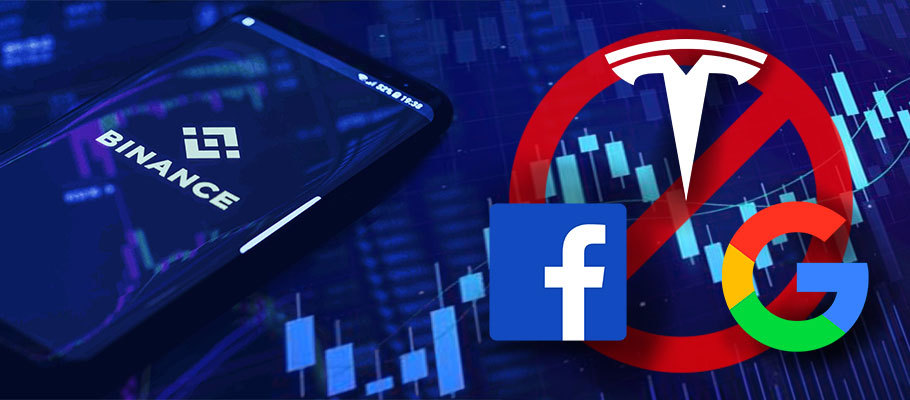
Published: August 16th, 2021
In the latest sign that financial regulators are forcing the world’s biggest crypto exchange to mend its ways, Binance has halted trading in stock tokens.
The measure is 'effective immediately' for new stock token purchases, the company announced this week. All support for existing stock tokens will end on 13th October. According to the company, the measure will enable Binance to focus on ‘other product offerings.’
Launched only this past April, Binance’s stock tokens are tokenised equities for popular public companies, including Google, Tesla, Facebook, Coinbase, and others. They’re listed on Binance through an arrangement with German investment firm CM-Equity, which has also partnered with Bittrex and FTX Exchange to enable similar stock token services.
Any user holding Binance stock tokens has 90 days to sell them or shift their holding to a new portal provided by CM-Equity, which is slated to open ahead of the 13th October deadline.
Notably, Hong Kong's Securities and Futures Commission made a statement shortly after Binance's announcement, warning consumers that Binance has not received a license or approval to offer stock tokens in Hong Kong, where the law treats them as securities. Consob, Italy's financial regulator, rang in a day later with an announcement of its own affirming that Binance isn't allowed to offer investment services of any kind in the country, referencing stock tokens specifically.
Though it isn’t made explicit in Binance's statement this week, Germany’s financial regulator BaFin announced in April that it had ‘reasonable grounds to assume the exchange’s stock tokens offering constituted a violation of securities laws. In the UK, the Financial Conduct Authority (FCA) started an investigation to determine whether stock tokens should be defined as securities. Financial regulators in both countries said that Binance hadn’t filed the papers needed to launch a new tradeable asset service.
On Thursday, 12th August, Hong Kong's financial watchdog warned that stick tokens are ‘almost certainly securities’ as defined by the city state’s Securities and Futures Ordinance law.
‘The SFC won’t abide any securities laws violations or hesitate to take strong action against platform providers operating without a license,’ said SFC director of enforcement, Thomas Atchison in the South China Morning Post.
Binance has been in the compliance spotlight for months now, targeted by financial regulators worldwide thanks to its vast scale, huge user footprint, and loose interpretation of local finance rules. According to CoinGecko, Binance chalked up more than USD 13 billion in trading volume in last Friday's trading alone. Coinbase, the next biggest crypto exchange, managed about USD 1.6 billion.
Authorities in the US, EU, and parts of Asia have said repeatedly that Binance doesn’t have permission, licensing, or required authorisation of any kind to provide services in their jurisdictions. Even though Binance doesn't formally ‘operate’ in some countries, accessing the exchange's services is easy. In most cases, a web browser and broadband internet connection are enough, regardless of location.
Tokenised stocks are a way for investors not entirely comfortable with crypto to dip a toe into the market using an asset they understand. The tokens work by representing an underlying asset, in this case, stock in a publicly-traded company like Google or Tesla.
That’s why more than one digital assets company has jumped into the market. Along with Binance, Bittrex and FTX Exchange, Swiss company Digital Assets AG launched a tokenised stock offering in June, enabling traders to sell them back and forth using Solana, a popular blockchain in decentralised finance (DeFi).
Stocks available on Digital Assets include Netflix, Square, PayPal, Facebook, Google, Nvidia, and Tesla.
In an announcement at the service’s launch, Digital Assets CEO Brendon Walliams said that the transferable stock tokens would ‘provide a bridge between traditional finance and crypto, including DeFi.’
Before the Digital Assets launch, tokenised stocks could only be traded on a centralised cryptocurrency exchange like Binance. Traders could open or close positions but didn’t have the ability to transfer their tokenised stocks across chains, withdraw them, or send them to an external party.
But the transferable tokenised stocks launched on Solana will allow centralised and decentralised exchanges built on that public blockchain to add tokenised stock trading to their platforms.
Earlier this month, we reported that Binance had launched a new tax reporting tool for users, part of a broader effort to smooth the ruffled feathers of financial regulators keen to bring the company’s slip-shod approach to compliance into line.
Through most of 2021, Binance CEO Changpeng Zhao (CZ) has been under pressure to prove that Binance is taking the concerns of financial regulators around the world seriously and fend off accusations that the exchange is a serial rule breaker.
‘I believe in a well-thought-out regulatory framework,’ he said in July. ‘Regulation can be the basis for advancing crypto as an essential part of everyday business life. He’s also said that the accelerating pace of crypto adoption worldwide means that ‘regulatory frameworks need to catch up in some countries.
The company's complex relationship with financial watchdogs has seen Malaysia’s financial oversight body say that it's essentially a rogue business in the country, operating without permission or licensing. In 2020, Malta, previously a supporter of Binance’s presence in the country, abruptly told it to pack up and cease providing services to island residents.
Britain’s FCA announced in June that it had a ‘major issue’ with Binance’s recalcitrant attitude and resistance to incorporating a British office, making it harder to hold executives accountable if regulatory laws are broken.
The FCA also said that the UK entity created to allow Binance to operate an exchange wasn't complying with British anti-money laundering rules.